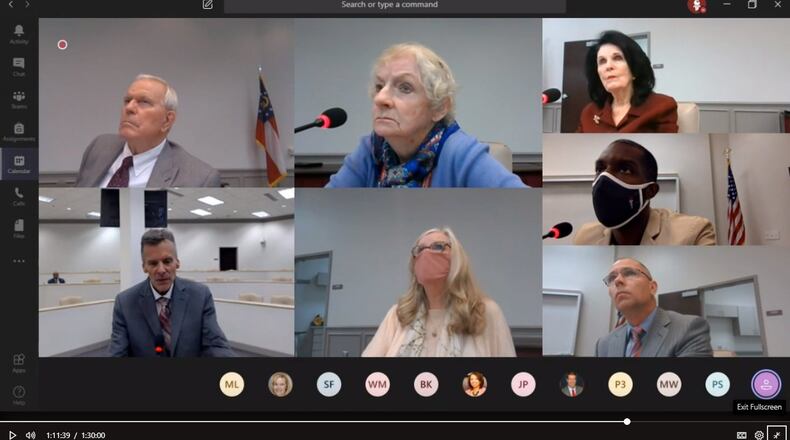The Gwinnett Board of Education unanimously passed a $2.3 billion tentative budget that won’t raise the local tax rate, doesn’t call for teacher layoffs, furloughs or reductions in pay, nor will it reduce student services.
Instead, Gwinnett officials will rely heavily on reserves — funds set aside for revenue shortfalls.
“We first started the budgeting process looking at $24 million in improvement items. It was short-lived,” said Superintendent J. Alvin Wilbanks at the June 25 budget hearing. “In the current budget draft we were looking at $150 million or a 14% reduction. That was again changed to 10% or $110 million reduction. Needless to say it will be a very tight budget, but still provide a quality educationfor our 181,268 students for the 2020-2021 school year.”
RELATED STORY: Parents group calls for ending Gwinnett school police program
RELATED STORY: Gwinnett rolls out plan for in-person classes this fall
In his presentation, Joe Heffron, Chief Financial Officer for Gwinnett County Public Schools, looked at changes affecting the budget.
Tax revenue
A report released on April 14 by the Andrew Young School of Policy Studies’ Fiscal Research Center gave an early estimate of the economic impact of the dramatic drop in business operations due to the coronavirus. As much as $1.27 billion in sales tax could be lost. That amounts to $110 million less coming to Gwinnett schools.
Conversely, the county property tax digest has projected growth for the seventh consecutive year. It is estimated to increase 3.5% over last year because of new growth and development as well as an increase in revaluation of existing properties. Although the millage rate won’t increase, property owners may see their tax bill go up. The additional revenue is expected to be $22.4 million over last year’s collections.
However, title ad valorem taxes (car tags), real estate transfers, intangible tax and interest earnings are expected to decline by a combined $8.7 million.
“The reduction is from the change in the birthday tax — where you paid for the car tags every year on your birthday,” said Heffron. “Now the bulk is handled with the initial sale.”
He added that there aren’t as many mortgages or home sales. With the decline in interest rates, investment income is down.
In all, the school system will see an estimated $34.7 million in the new fiscal year from county taxes.
Federal funds
The CARES Act, signed into law in March, provides funding and flexibility for states to respond to the COVID-19 pandemic in K-12 schools. It gives states $13 billion to support school districts. Georgia received $457 million and of that Gwinnett received $32.3 million.
This funding is set to cover a wide range of activities, including cleaning and sanitizing schools, purchasing educational technology such as laptops and hot spot devices, training educators to use online learning tools, ensuring access to education for students with disabilities, and providing students emergency funding for food, housing and other basic essentials.
Gwinnett used its portion to supplement the General Fund which is for day-to-day operations. At 77% of the total budget, the largest share goes toward salaries and benefits.
‘Rainy Day’ Fund
The lean times following the, economic downturn between 2007 and 2009 became an eye-opener for Gwinnett school officials. Austerity cuts to the school funding formula and the resulting declines in property values forced the district to operate with significantly fewer resources. By 2014, as money became less restricted, Gwinnett began putting money in reserves.
The economic impact of the coronavirus pandemic has made dipping into that reserve necessary for the first time in more than a decade. As of June 30, the school system had nearly $220 million saved. It has budgeted $65 million of that to offset the reduction of state funds.
Although the millage rate won’t increase, the amount of property tax generated will. By law, Gwinnett must hold two public hearings before the final vote to accept the budget. Those will be held 7 p.m. July 9 and 6 p.m. July 16 at the J. Alvin Wilbanks Instructional Support Center, 437 Old Peachtree Road in Suwanee.
The final budget adoption will be voted on July 16 during the regular 7 p.m. Board of Education meeting. The first millage rate adoption will begin in August.
Gwinnett County Public Schools tax hearings
7 p.m. July 9 and 6 p.m. July 16 at the J. Alvin Wilbanks Instructional Support Center, 437 Old Peachtree Road in Suwanee.
Information: gwinnett.k12.ga.us
About the Author
Keep Reading
The Latest
Featured




